Coronavirus and Communities
Activists step up door-to-door work to protect poor communities
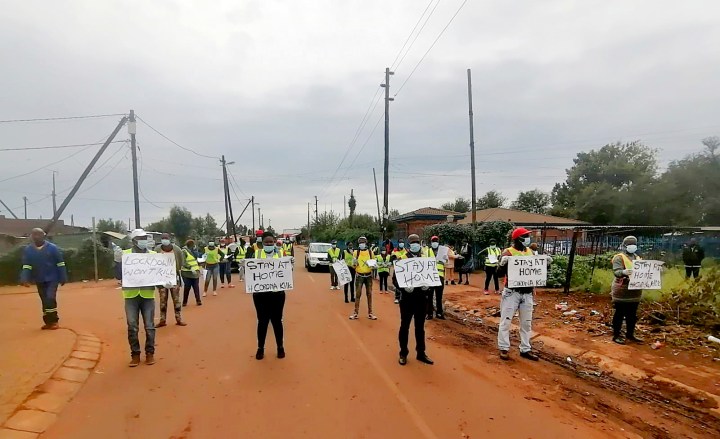
One of the lasting lessons of the Aids epidemic has been the importance of involving communities directly in epidemic prevention, treatment and care. In addition, it has been understood that community activists, who are known and trusted by local residents, are usually the best people to mobilise communities behind public health messages.
Almost three weeks after South Africa declared a State of National Disaster, and in the face of mounting evidence that many communities still distrust and don’t completely understand key messages about Covid-19 prevention, the value of supporting community mobilisation has barely been recognised.
As a result, activists are once more doing it for themselves and these are some of the activities Maverick Citizen has heard about.
There’s new energy and purpose in civil society. In a mere three weeks, more than 200 organisations from every walk of activism have joined a new civil society alliance called the C-19 People’s Coalition. A website has been set up, WhatsApp groups buzz 24 hours a day, eight working groups meet almost daily to focus on different areas of the response and energy is being channelled towards the people most vulnerable to Covid-19 – the poor and socially marginalised.

Last week in Protea South, Soweto, 28 community members walked through streets in the neighbourhood to create awareness. Photo: Bongani Xezwi
However, what marks this work is the need to empower local communities against Covid-19 and whether it be through Collective Actions Networks (CANs) in Cape Town or the branches of social movements like TAC or Right2Know, the focus is turning to community preparedness, protection and food security.
Last week, for example, in Protea South, Soweto, 28 community members conducted a walk through every street in the neighbourhood to help stop the spread of Covid-19. According to Bongani Xezwi, an organiser for the Right2Know campaign in Gauteng and founder of Soweto Sukuma Sinqobe: “The reality is that since the lockdown came into force, large numbers of residents in our poor community, as in many similar ones around the country, have been acting as though it is business as usual – lots of people walking and hanging around the streets, groups of children playing their regular games, while others sit at close quarters gambling.”
“During our walk through the community, we were carrying posters and distributing educational pamphlets about the coronavirus as well as loud-hailing relevant messages from a van. Our main message was for people to stay at home and follow all the health safety guidelines as much as is possible.”

The main message from the Soweto community group was for people to stay at home and follow all the health safety guidelines as much as is possible. A local woman has a notice on her gate informing prospective visits that nobody can enter during the Covid-19 lockdown period. (Photo: Bongani Xezwi)
When I asked about the safety of the volunteers and community, Xezwi pointed out that all 28 of the volunteers had gone through a workshop about how to keep themselves and those around them safe. The organisers made sure everyone had the necessary protective materials and that everyone adheres to the physical distancing guidelines.”
Xezwi noted the positive response from the community as well as some “saying negative statements” that highlight community fears and misunderstandings: “We are unemployed, let Corona kill us once. What is the point of life if you don’t have means to survive?” asked one person. Some were saying: “Let [Cyril] Ramaphosa come tell us to stay at home, we don’t have electricity … Can he stay in the house with no electricity?”
“However, most of the people and children did listen to us and went home,” said Xezwi.
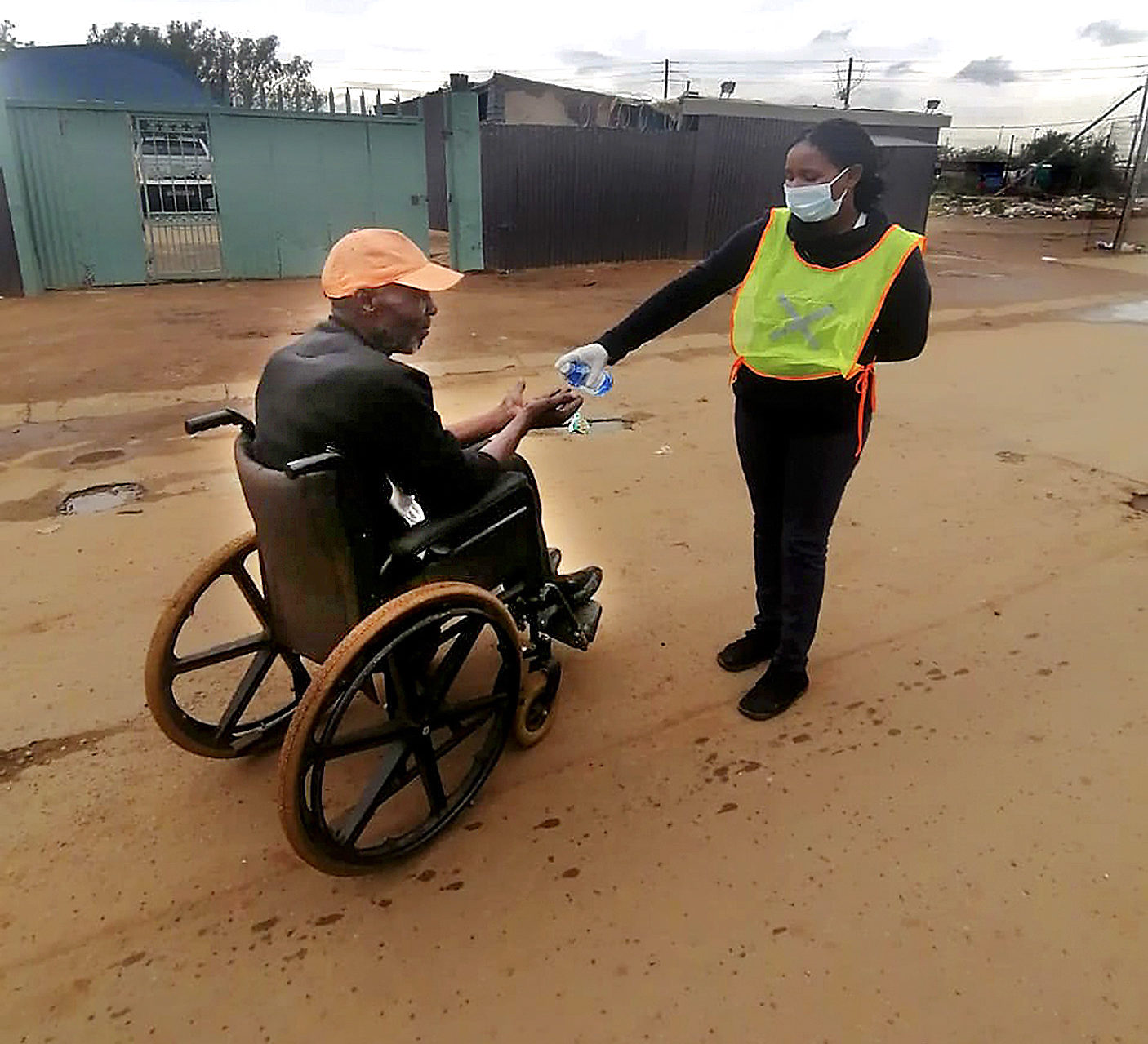
Community memmbers, in Protea South, Soweto conducted a walk through every street in the neighbourhood to among others share hand sanitiser. (Photo Bongani Xezwi)
“The volunteers were also able to identify people that needed assistance with food and sanitisers. We are planning to continue doing this till the end of the lockdown, 15 April 2020. We don’t believe that the police and the army have a clear strategy of how to deal with the community without being brutal … For this reason, we hope the police should meet us and we find ways of working together fighting this Covid-19.
“We hope soon we will be giving food parcels to those whom we have identified as a priority for urgent assistance.”
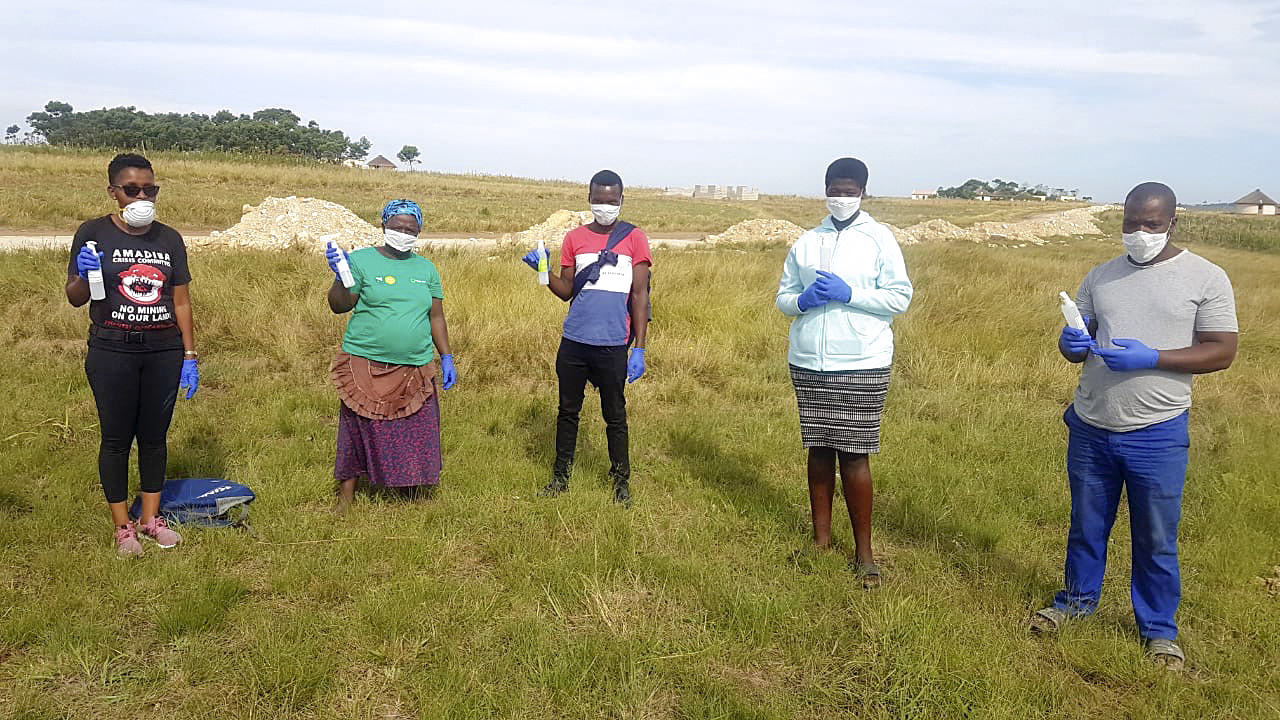
The local Amadiba Crisis Commitee team in Bekela village preparing to distribute sanitizers, masks and gloves. Photo supplied.
On the other side of the country, the Amadiba Crisis Committee (ACC) has continued activities that it started on Human Rights Day by distributing hand sanitisers and protective masks to the villages, and clinics on the Amadiba coast in Mbizana, Eastern Cape.
According to Nonhle Mbuthuma, Chairperson of the ACC, their rollout of equipment followed four information meetings about Covid-19 held by the ACC in villages on 19, 20, 21 and 23 March 2020.
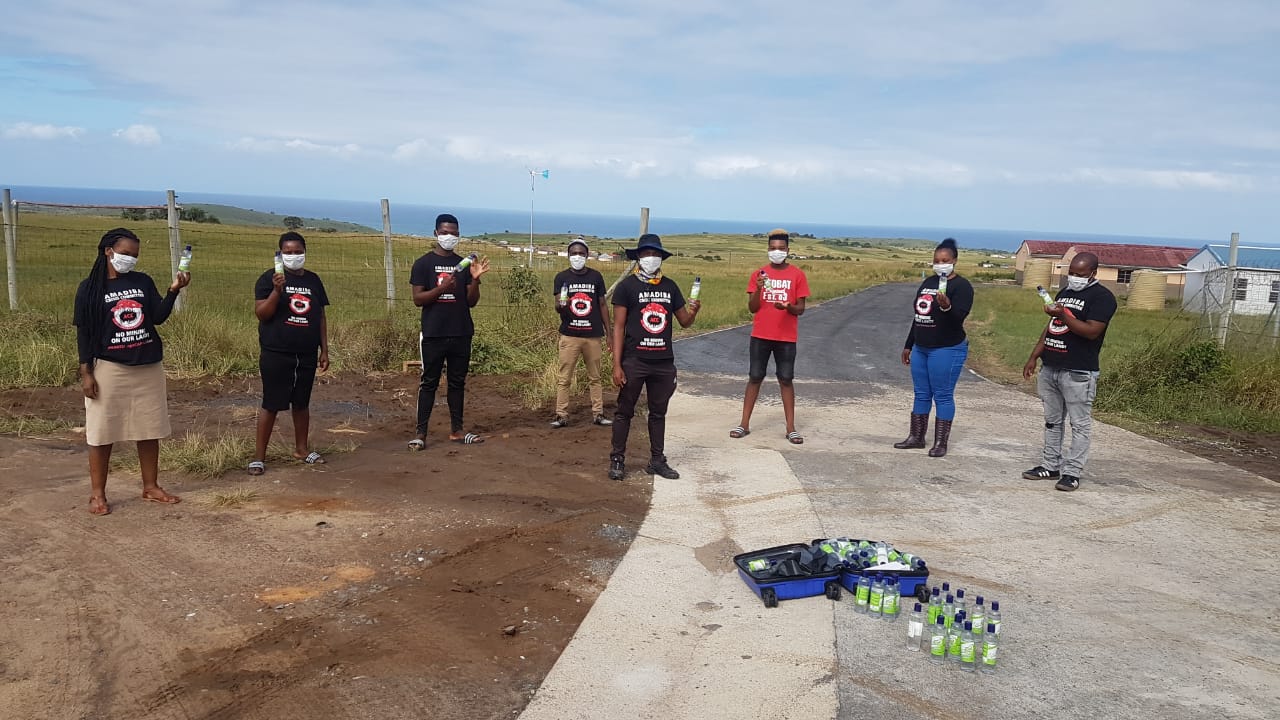
Amadiba Crisis Committee members preparing to go to the homesteads in Sigidi village. Photo supplied.
She told Maverick Citizen: “As ACC, we are not aware of any activity organised by the Mbizana Local Municipality. Today, we also distributed hand sanitisers to two clinics, the Amadiba and Mgungu clinics. The Amadiba clinic close by Wild Coast casino was running out of sanitiser when ACC visited and gave 10 bottles. At Mgungu, which is more in rural areas, they didn’t have any sanitiser. The police at Mtamvuna River had also run out.”
“If our brave nurses in Amadiba get sick, the whole community is in deep trouble. They have to be protected at all costs.”
Mbuthuma laments that: “We learned from the past that Aids affected the rural areas a lot, because of lack of information. Information gets stuck in the suburbs. That is why we as ACC this time have decided not to repeat history.”
Based on their experience, the ACC has pointed out to the government that “one size does not fit all”. They argue: “The State of Disaster rules in a rural area like ours must be changed.”
“Right now, people are scared to be arrested if they go out. But you can’t stay inside houses in a rural area. We take care of livestock and do farming to stay food secure. When we fish in the ocean, we meet no one. To meet no one is safe.”
The ACC has therefore applied for a permit that the community be allowed to do small-scale farming and fishing.
Community wisdom speaks the plainest of truths: “It is easier to keep distance to other people outside in the open than with all sitting inside in one rondavel. If the police understand the purpose of the lockdown, they will understand this. Surely, they know this is not Durban.”
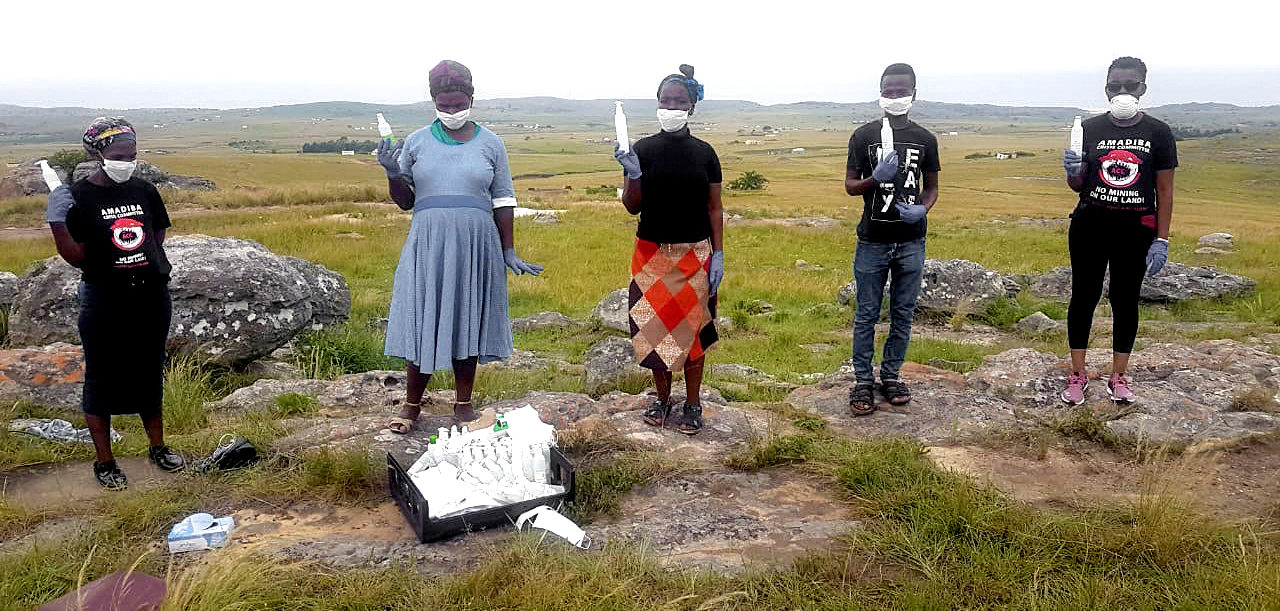
An Amadiba Crisis Committee team in Mdatya village preparing to go to the homesteads. About 160 homesteads were covered. (Photo: Supplied )
“If family members are coming home from cities, the right thing to do is isolate. This is not impossible. Our homesteads usually have several houses.”
“People in Amadiba are scared to go out for no good reason. But today, we had tourists from Durban fishing on the coast in Mdatya. How did they pass the provincial roadblock at Mtamvuna river?!”
Mbuthuma, Xezwi and many other community organisations, and activists recognise the government’s leadership role and its call for support. However, given that they are based in poor communities, they see the many shortcomings, gaps and consequences of poor planning and implementation – and yet (and this is a story for another day), activists lament that, at this point, there are almost no systems to engage the government on these issues and their solutions. All in all ACC covered 800 homesteads.
Mbuthuma’s parting words sum up the problem: “As ACC, we are doing what we can to support Covid-19 prevention. It is, however, difficult to work on the ground if the government starts to enforce the law before informing people, and if some laws cannot be followed. We are a very unequal society. One size does not fit all. All human beings must eat.” MC
Maverick Citizen is doing all we can to ensure that social justice journalism strengthens the response to Covid-19. If you have examples of effective community mobilisation and campaigns that others could copy, please send them to us on [email protected]
"Information pertaining to Covid-19, vaccines, how to control the spread of the virus and potential treatments is ever-changing. Under the South African Disaster Management Act Regulation 11(5)(c) it is prohibited to publish information through any medium with the intention to deceive people on government measures to address COVID-19. We are therefore disabling the comment section on this article in order to protect both the commenting member and ourselves from potential liability. Should you have additional information that you think we should know, please email [email protected]"




 Become an Insider
Become an Insider